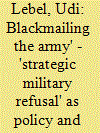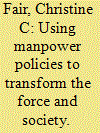|
|
|
Sort Order |
|
|
|
Items / Page
|
|
|
|
|
|
|
| Srl | Item |
| 1 |
ID:
131978


|
|
|
|
|
| Publication |
2014.
|
| Summary/Abstract |
The study shows how 'strategic military refusal' in Israel developed as a rational and institutional means to influence security policies. As opposed to the perspective that sees military refusal as a spontaneous individual act, the study illustrates how organizations operate to distribute military refusal in order to pressure decision-makers to change their military policies. This strategy has proven to be effective when the military is involved with groups that threaten it with refusal - which threatens the military's operational ability and its official and apolitical image. These include soldiers whose civilian authorities, rather than their military commanders, are perceived as an epistemic authority regarding security issues. The case study refers to the impact of strategic military refusal in Israel on security policies and the military doctrine. This was influenced by leftist groups, which, although they belonged to the parliamentary opposition, had dominant presence in the military ranks. Furthermore, the study examines the effect of the use of strategic military refusal on the model of military recruitment.
|
|
|
|
|
|
|
|
|
|
|
|
|
|
|
|
| 2 |
ID:
133059


|
|
|
|
|
| Publication |
2014.
|
| Summary/Abstract |
The Indian soldiers, on account to their faith in the otters who lead them, their innate goodness and the discipline that has been ingrained in them have a great capacity to accept and absorb wrongs but it these continue to happen on a sustained and regular basis, as is happening, then it would be foolish to expect them to keep accepting policies that are patently discriminatory! The aspirations at the military may continue to be ignored but at the risk ot a revolt, or even a coup!
|
|
|
|
|
|
|
|
|
|
|
|
|
|
|
|
| 3 |
ID:
130266


|
|
|
|
|
| Publication |
2014.
|
| Summary/Abstract |
Military manpower policies have an impact beyond the garrison. Policymakers have long held that military service can darn social fabrics that have been rent by ethnic, communal, class, and other cleavages, while scholars debate whether and how this occurs. Because military participation has implications for citizenship, marginalized groups have campaigned to be allowed to participate in the military, and leveraged their service to achieve greater enfranchisement. Military service affects the society as a whole in other ways as well: for example, leaders with military experience are less likely than others to prefer military force when other options are available. This paper examines the Pakistan Army, which, with its domination of the state, feared Islamist tendencies, and incessant belligerence toward India, seems to differ markedly from other militaries. But, using army recruitment and household survey data, it shows that even the Pakistan Army has used personnel policies to reshape its force, despite the numerous challenges of such a course. Whereas recent manpower studies dilate upon how socially marginalized groups employ military service to achieve greater access to citizenship, my analysis exposits how an army uses service in its ranks to cajole reluctant citizens into the national project of Pakistan and encumber them with the responsibilities and rights thereof. While this essay provides greater insights into the Pakistan Army specifically by focusing upon this ostensible anomaly, I hope to inform the larger literature on defense politics and the instrumentality of manpower policies.
|
|
|
|
|
|
|
|
|
|
|
|
|
|
|
|
| 4 |
ID:
131891


|
|
|
|
|
|
|
|